Prince Alexander of Hesse and by Rhine
Last updatedThis article needs additional citations for verification .(June 2019) |
| Prince Alexander | |||||
|---|---|---|---|---|---|
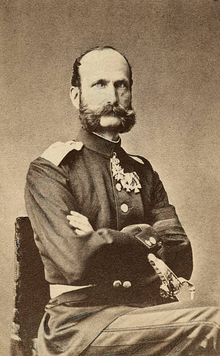 | |||||
| Born | 15 July 1823 Darmstadt, Hesse | ||||
| Died | 15 December 1888 (aged 65) Jugenheim, Hesse | ||||
| Burial | Rosenhohe, Darmstadt | ||||
| Spouse | Julia, Princess of Battenberg | ||||
| Issue | |||||
| |||||
| House | Hesse-Darmstadt | ||||
| Father | Louis II, Grand Duke of Hesse (officially) August von Senarclens de Grancy (rumored) | ||||
| Mother | Wilhelmine of Baden | ||||
| Grand Ducal Family of Hesse and by Rhine |
|---|
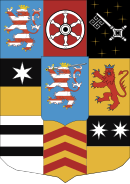 |
| Louis II |
|
Prince Alexander of Hesse and by Rhine GCB (Alexander Ludwig Georg Friedrich Emil; 15 July 1823 – 15 December 1888), was the third son and fourth child of Louis II, Grand Duke of Hesse, and Wilhelmine of Baden. He was a brother of Tsarina Maria Alexandrovna, wife of Tsar Alexander II of Russia. The Battenberg-Mountbatten family descends from Alexander and his wife Countess Julia von Hauke, a former lady-in-waiting to his sister.
Contents
Family and background
It was openly rumoured that Alexander and his sister Marie were not the children of the Grand Duke, but that their father was actually August von Senarclens de Grancy, their mother's chamberlain. His mother, although married to the grand duke, lived apart from her husband, who did not repudiate paternity of any of the four children born during the marriage. His ancestry listed below assumes his legitimacy. See Grancy's page for his rumored paternal ancestry.
When the future emperor Alexander II of Russia, as tsarevich, chose the sixteen-year-old Marie as consort, his parents consented to the match as worthy due to the Grand Duke's acknowledgement of her as his daughter. Because of her youth, Alexander escorted his sister to Russia for her wedding, remaining at the Russian court and joining the inner circle of his brother-in-law the tsarevich after the rest of Marie's entourage returned to Hesse.
Alexander's marriage
Alexander fell in love with Countess Julia von Hauke, lady-in-waiting to his sister (known, since her conversion to Orthodoxy, as Maria Alexandrovna, ranking only after her mother-in-law the Empress Alexandra Feodorovna). The countess was an orphaned German-Polish ward of the Russian Emperor, and daughter of the Emperor's former minister of war, Count Johann Moritz von Hauke, a Polish general of German descent. At that time, the Emperor Nicholas I was considering Alexander as a possible husband for his niece and, when he heard of Alexander's romance, he forbade the couple to marry.
Alexander left for England to contemplate his future, but then returned to Russia and eloped with Julia from St. Petersburg, being stricken by the Emperor's orders from the roll of the Russian imperial army for insubordination. The two were married in Breslau in 1851.
Alexander's older brother Louis III, Grand Duke of Hesse, allowed him to re-patriate to Hesse with his bride, although he did not recognize their marriage as dynastic. He granted her the new, hereditary title of Gräfin von Battenberg (Battenberg was a small town and ruined castle in the north of the grand duchy which, according to the memoirs of their eldest child Marie, the family visited once during her youth, although it never became their residence).
Alexander's wife would deliver his first child barely six months after their elopement. Nonetheless, Julia von Hauke was a countess in her own right, as well as a former ward of the Russian Emperor whose husband retained, despite exile from Russia, the sympathetic support of the tsarevich and tsarevna. Grand Duke Louis III therefore chose to distinguish her from several non-royal wives of other Hessian princes by conferring upon her, along with the Battenberg countship, the style of Erlaucht (Illustrious Highness), usually reserved in Germany for counts of mediatized (i.e., dynastic) rank.
Career
As a cadet of the Hessian grand ducal dynasty, Prince Alexander had followed the martial tradition of his family by offering his sword to the military service of a Great Power while still a teenager, having accompanied his sister to St. Petersburg. He became a respected commander in the Russian army, with the prospect of a distinguished career. He had a regiment of lancers named after him and was awarded the Order of St. George 4th class. His elopement, in sending him abroad AWOL, terminated his military career and made him, initially, a fugitive from Russia.
But once his elder brother recognized his wife, he was able to obtain an appointment in the Austrian army, where he resumed his military career, although remaining sufficiently in disgrace never to be billeted in Vienna. Each of his children would be born in a different city, depending upon where in the Austro-Hungarian empire Prince Alexander was stationed.
After serving Austria with distinction in several battles, he was given a major command in Hesse's small army in its war, as an ally of Austria, with Prussia in 1866. By this time his wife and children had taken up their home at Alexander's small castle at Seeheim-Jugenheim in Hesse, to which he retired after Prussia defeated Austria and Hesse. Although the electorate of Hesse-Kassel, ruled by another branch of Alexander's family, was annexed by Prussia for adhering to the losing side, the fact that Hesse-Darmstadt's grand duke was the brother-in-law of the Russian tsar saved its independence, although not without loss of territory. Henceforth, Alexander and his family alternated between their castle in the grandducal capital of Darmstadt, and their country home a few hours away by carriage.
Alexander was often in attendance at his elder brother's court. But a shift occurred when his sister, now Empress of Russia, began to pay annual visits to her brother in the 1870s along with her husband, children, and a large entourage. Louis III, while benefitting from his kinship to the tsar, preferred to defer entertaining him to Alexander and Marie at Heiligenberg. These annual visits had the twofold effect of enhancing the international prestige of the grandduchy while socially rehabilitating Alexander's morganatic household. The memoirs of his daughter, Marie of Battenberg, document the cordiality between Alexander and his eldest brother, while also recording the growing importance of her own family's household as diplomats who wished to pay court to the Russian emperor would await his annual visit to the Hessian countryside to do so discreetly in the more intimate setting of Alexander's home.
Children
Although Prince Alexander retained his own dynastic rights and appanage, his morganatic wife lived a quiet life. Their family lived primarily at Heiligenberg Castle, in southern Hesse. In 1858 Grand Duke Louis III raised his sister-in-law from "Countess" to "Princess" (Prinzessin) von Battenberg, her children sharing in the princely title, and accorded them the style of Serene Highness (Durchlaucht).
Alexander of Hesse and Julia of Battenberg had five children. The children were:
- Princess Marie of Battenberg 1852–1923
- Prince Louis of Battenberg 1854–1921
- Prince Alexander of Battenberg, 1857–1893
- Prince Henry of Battenberg 1858–1896
- Prince Francis Joseph of Battenberg 1861–1924
Prince Alexander of Hesse died of cancer in 1888; Princess Julia of Battenberg, having converted to Lutheranism in 1875, died at Schloss Heiligenberg in 1895 at the age of 70. They lived to see four of their five children, who had no rights of succession to the Hessian throne, mount a throne or marry dynastically, and to become welcome in-laws to Queen Victoria, whose correspondence reflected a consistent respect and fondness for the Battenberg family.
Descendants
Prince Alexander's children formed marital ties with several reigning families.
- Prince Louis married Princess Victoria (daughter of Queen Victoria's second daughter, Alice). Their children included:
- Princess Louise became Queen of Sweden through her marriage to Gustaf VI Adolf of Sweden.
- Princess Alice married Prince Andrew of Greece and Denmark, with whom her children include Prince Philip, Duke of Edinburgh, the husband of Queen Elizabeth II and father of King Charles III of the United Kingdom.
- Prince Henry married Queen Victoria's youngest daughter, Beatrice. Their only daughter:
- Princess Ena became queen of Spain upon her marriage to King Alfonso XIII of Spain. Their grandson Juan Carlos I was King of Spain until 2014 when he abdicated in favor of his son, Felipe VI.
- Prince Alexander became the first reigning Prince of modern Bulgaria. He obtained the consent of Frederick III, German Emperor, to marry his daughter, Princess Viktoria of Prussia, whose mother and grandmother, Queen Victoria, also supported the marriage as a love match. But even before Alexander was deposed from his throne, the marriage was opposed by Prince Bismarck for political reasons and by his fiancée's brother, Wilhelm II, as a matter of dynastic pride, prompting Queen Victoria to withdraw her support as a concession to diplomacy, and Alexander to lose interest in favor of a morganatic marriage to Johanna Loisinger.
Honours and awards
Prince Alexander received the following awards: [1]
 Hesse-Darmstadt: [2]
Hesse-Darmstadt: [2] - Grand Cross of the Ludwig Order, 8 November 1839
- Grand Cross of the Merit Order of Philip the Magnanimous, with Swords, 1 May 1840
- Military Medical Cross, 2 April 1871
-
 Hesse-Kassel: [3]
Hesse-Kassel: [3] - Grand Cross of the Golden Lion, 29 December 1847
- Knight of the Military Merit Order, 20 March 1860
-
 Anhalt: Grand Cross of the Order of Albert the Bear
Anhalt: Grand Cross of the Order of Albert the Bear  Bavaria : Knight of St. Hubert, 1852 [4]
Bavaria : Knight of St. Hubert, 1852 [4]  Baden: [5]
Baden: [5] - Knight of the House Order of Fidelity, 1843
- Grand Cross of the Zähringer Lion, 1843
 Brunswick: Grand Cross of the Order of Henry the Lion
Brunswick: Grand Cross of the Order of Henry the Lion  Mecklenburg:
Mecklenburg: - Grand Cross of the Wendish Crown, with Crown in Ore
- Military Merit Cross, 2nd Class (Schwerin)
 Nassau: [6]
Nassau: [6] - Knight of the Gold Lion of Nassau, June 1863
- Grand Cross of the Order of Adolphe of Nassau, with Swords, September 1864
 Prussia: [7]
Prussia: [7] - Knight of the Black Eagle, 25 September 1847
- Pour le Mérite (military), 3 November 1859
- Knight of Honour of the Johanniter Order, 23 May 1884
 Saxony : Knight of the Rue Crown, 1872 [8]
Saxony : Knight of the Rue Crown, 1872 [8]  Saxe-Weimar-Eisenach: Grand Cross of the White Falcon, 1 October 1857 [9]
Saxe-Weimar-Eisenach: Grand Cross of the White Falcon, 1 October 1857 [9]  Württemberg: Grand Cross of the Württemberg Crown, 1857 [10]
Württemberg: Grand Cross of the Württemberg Crown, 1857 [10]  Austria : [11]
Austria : [11] - Grand Cross of the Imperial Order of Leopold, September 1857
- Knight of the Military Order of Maria Theresa, 1859
- Grand Cross of the Royal Hungarian Order of St. Stephen, 1874
 Bulgaria : Grand Cross of St. Alexander
Bulgaria : Grand Cross of St. Alexander  Denmark: Knight of the Elephant, 20 November 1875 [12]
Denmark: Knight of the Elephant, 20 November 1875 [12] -
 Greece: Grand Cross of the Redeemer
Greece: Grand Cross of the Redeemer  Italy : Grand Cross of Saints Maurice and Lazarus
Italy : Grand Cross of Saints Maurice and Lazarus  Monaco: Grand Cross of St. Charles, 23 April 1865 [13]
Monaco: Grand Cross of St. Charles, 23 April 1865 [13]  Ottoman Empire: Order of Osmanieh, 1st Class
Ottoman Empire: Order of Osmanieh, 1st Class Russia :
Russia : - Knight of St. Andrew, in Diamonds, 15 April 1841 [14]
- Knight of St. Alexander Nevsky, 15 April 1841 [14]
- Knight of the White Eagle, 15 April 1841 [14]
- Knight of St. Anna, 1st Class, 15 April 1841 [14]
- Knight of St. George, 4th Class, 1845; 3rd Class, July 1859
- Knight of St. Vladimir, 1st Class
 United Kingdom : Honorary Grand Cross of the Bath (military), 22 July 1885 [15]
United Kingdom : Honorary Grand Cross of the Bath (military), 22 July 1885 [15]
Ancestry
| Ancestors of Prince Alexander of Hesse and by Rhine |
|---|
Related Research Articles

Alexander Joseph, known as Alexander of Battenberg, was the first prince (knyaz) of the Principality of Bulgaria from 1878 until his abdication in 1886. The Bulgarian Grand National Assembly elected him as Prince of autonomous Bulgaria, in 1878. He dissolved the assembly in 1880 and suspended the Constitution in 1881, considering it too liberal. He restored the Constitution in 1883, leading to open conflict with Russia that made him popular in Bulgaria. Unification with Eastern Rumelia was achieved and recognised by the powers in 1885. A coup carried out by pro-Russian Bulgarian Army officers forced him to abdicate in September 1886. He later became a general in the Austrian army.

Julia, Princess of Battenberg, previously Countess of Battenberg and Countess Julia von Hauke, was the wife of Prince Alexander of Hesse and by Rhine, the third son of Louis II, Grand Duke of Hesse.

Louis IV was the Grand Duke of Hesse and by Rhine from 13 June 1877 until his death in 1892. Through his marriage to Queen Victoria's second daughter Alice, he was connected to the British royal family. Two of his daughters married into the House of Romanov.

George V was the last king of Hanover, reigning from 18 November 1851 to 20 September 1866. The only child of King Ernest Augustus and Queen Frederica, he succeeded his father in 1851. George's reign was ended by the Austro-Prussian War, after which Prussia annexed Hanover.

Prince Albert of Prussia was a Prussian general field marshal, Herrenmeister of the Order of Saint John from 1883 until his death, and regent of the Duchy of Brunswick from 1885, also until his death.

Charles was King of Württemberg from 25 June 1864 until his death in 1891. Charles I married Grand Duchess Olga Nikolaevna of Russia in 1846 and ascended to the throne in 1864. Despite their marriage, the couple had no children, likely due to Charles' homosexuality. Charles was involved in several scandals, including a close relationship with American Charles Woodcock. In 1870, the couple adopted Olga's niece, Vera Konstantinovna. Charles I aligned with Austria during the Austro-Prussian War but later sided with Prussia in the Franco-Prussian War, joining the new German Empire in 1870. He died childless and was succeeded by his sister's son, William II.

Grand Duke Konstantin Nikolayevich of Russia was the Emperor's Viceroy of Poland from 1862 to 1863.

Ernest Louis was the last Grand Duke of Hesse and by Rhine, reigning from 1892 until 1918.

Maximilian Joseph Eugene Auguste Napoleon de Beauharnais, 3rd Duke of Leuchtenberg, Prince Romanowsky was the husband of Grand Duchess Maria Nikolayevna of Russia and first cousin of Emperors Napoleon III of the French and Francis Joseph I of Austria. He was a grandson of Napoleon I's first wife, the Empress Josephine, by her prior marriage to Alexandre de Beauharnais.

Prince Frederick Charles Alexander of Prussia was a younger son of Frederick William III of Prussia. He served as a Prussian general for much of his adult life and became the first Herrenmeister of the Order of Saint John after its restoration as a chivalric order. Nevertheless, he is perhaps remembered more often for his patronage of art and for his sizable collections of art and armor.
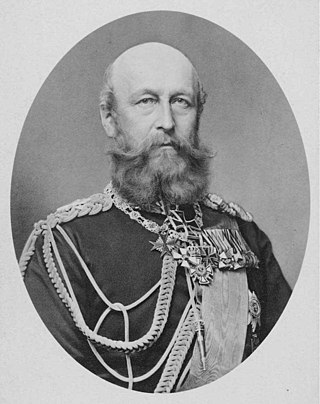
Frederick Francis II was a Prussian officer and Grand Duke of Mecklenburg-Schwerin from 7 March 1842 until 15 April 1883.
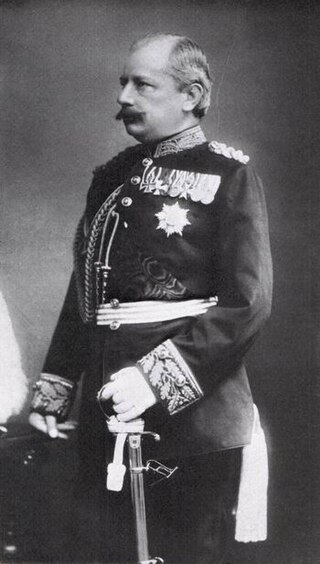
Karl August, Hereditary Grand Duke of Saxe-Weimar-Eisenach was a German prince and Hereditary Grand Duke (Erbgroßherzog) of Saxe-Weimar-Eisenach.

Adolphus Frederick V was reigning grand duke of Mecklenburg-Strelitz from 1904 to 1914.
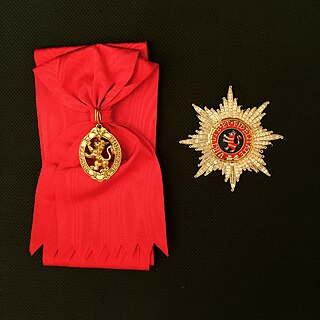
The House Order of the Golden Lion was an order of the German Landgraviate and Electorate of Hesse-Kassel and later, the Grand Duchy of Hesse and by Rhine. It was first instituted in 1770 by Landgrave Frederick II, in honour of and under the patronage of Saint Elizabeth of Hungary, an ancestor of the House of Hesse, and was intended to award auspicious merit.

Frederick William George Adolphus, Landgrave of Hesse was the only son of Wilhelm I, Landgrave of Hesse-Kassel-Rumpenheim and Princess Louise Charlotte of Denmark.
Alexander, Prince of Erbach-Schönberg was the 2nd Prince of Erbach-Schönberg, eldest son of Gustav, 1st Prince of Erbach-Schönberg.
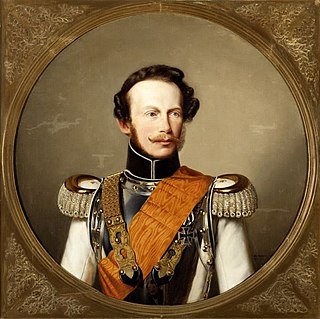
Prince Frederick William Louis of Prussia was a Prussian prince and military officer.
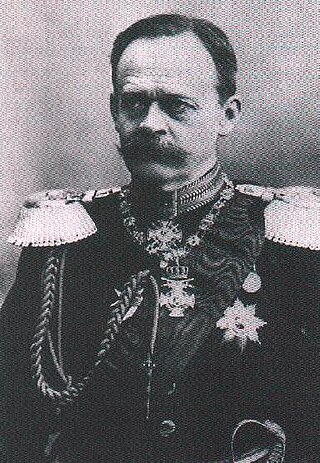
Heinrich VII, Prince Reuss of Köstritz was a German diplomat.

Hermann George Bernard of Saxe-Weimar-Eisenach was Prince of Saxe-Weimar-Eisenach and Duke of Saxony, and a general in the Württemberger army.

Georg August was a member of the House of Mecklenburg-Strelitz.
References
- ↑ Hof- und Staats-Handbuch des Großherzogtum Hessen (1886/7), Genealogy pp. 3-4
- ↑ Hof- und Staats-Handbuch ... Hessen (1879), "Großherzogliche Orden und Ehrenzeichen" pp. 9, 46, 146
- ↑ Hessen-Kassel (1866). Kurfürstlich Hessisches Hof- und Staatshandbuch: 1866. Waisenhaus. pp. 15, 42.
- ↑ Bayern (1870). Hof- und Staatshandbuch des Königreichs Bayern: 1870. Landesamt. p. 9.
- ↑ Hof- und Staats-Handbuch des Großherzogtum Baden (1862), "Großherzogliche Orden" pp. 32, 44
- ↑ Staats- und Adreß-Handbuch des Herzogthums Nassau (1866), "Herzogliche Orden" pp. 9, 12
- ↑ "Königlich Preussische Ordensliste", Preussische Ordens-Liste (in German), 1, Berlin: 5, 11, 1048, 1886
- ↑ "Königliche Ritter-orden", Staatshandbuch für den Freistaat Sachsen (1873) (in German), Dresden, 1873, p. 4
{{citation}}: CS1 maint: location missing publisher (link) - ↑ Staatshandbuch für das Großherzogtum Sachsen / Sachsen-Weimar-Eisenach (1859), "Großherzogliche Hausorden" p. 13 Archived 2019-08-22 at the Wayback Machine
- ↑ Württemberg (Kingdom). Statistisches Landesamt (1877). Staatshandbuch für Württemberg. Druck von W. Kohlhammer. p. 22.